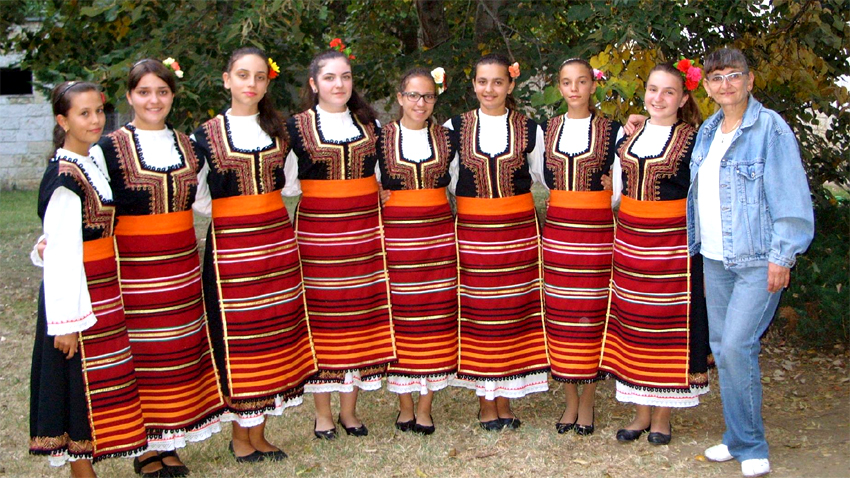Continuity is the unwritten law of the folklore code, as this is how traditional art forms have made it to the modern age. Once, the family was the natural environment, where songs, dances and other customs were passed on from one generation to another. Because this is the key to absorbing traditional culture.
Kids today glean their initial knowledge of folklore at school or at a chitalishte (culture community center) with a pedagogue. That is why experienced tutors such as Daniela Georgieva are priceless. She teaches children about folklore heritage, revealing the secrets of the ancient songs from the town of Samokov and the surrounding area. Daniela has graduated piano from the music high school in the town of Ruse on the Danube and later - from the music academy in Plovdiv as a music pedagogue. Life took her to Samokov, where she established the Medeni Zvancheta (honey-voiced bells) vocal band at the Mitropolit Avksenyi Veleshki primary school.
Daniela discovered folklore and for years now she has been tutoring local children in the unique ancient two-voice singing of the region.
 ‘My love for authentic Bulgarian folklore goes back to the band in the village of Shiroki Dol,’ Daniela says. ‘Three of its members worked at our school. I would pick up kids after work and we would all go to see the fourth woman, the so-called ‘caller’ – the one with the highest octave. We would sing for an hour or two and my task was streamline it in terms of intonation. Then I began to study folklore in greater depth. At first the kids and I sang Shopa pieces (music from the Shoppe region around Sofia) with a modern arrangement, sometimes we sang acapella. When I saw their enthusiasm, we turned to the original way of singing – in the beginning with faster and simpler songs, followed later on by slow pieces with lots of exclamations. The kids are doing just great so this is obviously the right way to go about it. I have been heading a Women’s Singing Band in the village of Govedartsi. One of the women there is a natural-born talent. This is how we work: the women sing a verse, then the students repeat it, in order to learn it properly.’
‘My love for authentic Bulgarian folklore goes back to the band in the village of Shiroki Dol,’ Daniela says. ‘Three of its members worked at our school. I would pick up kids after work and we would all go to see the fourth woman, the so-called ‘caller’ – the one with the highest octave. We would sing for an hour or two and my task was streamline it in terms of intonation. Then I began to study folklore in greater depth. At first the kids and I sang Shopa pieces (music from the Shoppe region around Sofia) with a modern arrangement, sometimes we sang acapella. When I saw their enthusiasm, we turned to the original way of singing – in the beginning with faster and simpler songs, followed later on by slow pieces with lots of exclamations. The kids are doing just great so this is obviously the right way to go about it. I have been heading a Women’s Singing Band in the village of Govedartsi. One of the women there is a natural-born talent. This is how we work: the women sing a verse, then the students repeat it, in order to learn it properly.’
Mrs. Georgieva has headed the Children’s Vocal Band in the village of Belchin for 5 years. In 2018 the Medeni Zvancheta band will celebrate 25 years since it was founded. Daniela says that the school which she works at is applying under the ministry of education innovation program.
‘Everybody loves folklore at our school. We have our own clothing, replicas of authentic national costumes. We rely on a deeper insight into folklore during the regular music classes – in terms of sound production and the typical open singing. We also study songs from other folklore regions. The lyrics and dialect words are taught during literature classes. We have also included history and fine arts, as Samokov has strong traditions, it is called the city of icon-painters. We have beautiful lace and embroidery on our clothing. The gym classes lay an emphasis on the typical Samokov horo or chain dances…’
Experts say Daniela Georgieva has done an excellent job and her formations have won numerous awards at different national contests: Orfeevo Izvorche – Stara Zagora; Orfeeva Darba – Sofia, Decata na Balkanite – Haskovo Mineral Springs, Folklor bez Granici – Dobrich they are also laureates of the Magic of Italy Festival in Rimini, Italy.
English version: Zhivko Stanchev
Halva, this sweet temptation with an oriental twist, is a welcome delicacy on the Bulgarian table, especially on holidays. Judging by the descriptions of Western travellers, halva was a common dessert in Bulgarian lands as early as the 16th century. The..
The Youth Centre "Zahari Stoyanov" in the town of Dobrich, Northeastern Bulgaria, is organizing a folklore meeting of communities on the occasion of the International Day of Tolerance. The aim of the event, which will take place from today to 17..
The Bulgarian folklore dance group Vito Horo from Perth will take part in the multicultural women’s festival Harmony of Colours, taking place tonight in the Australian city, the Bulgarian association Rodina has announced. Besides the Bulgarian..

+359 2 9336 661
